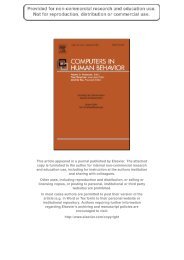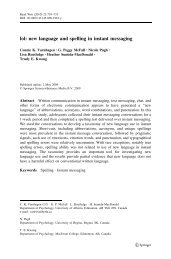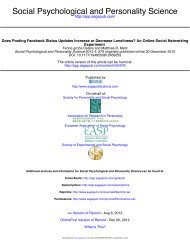Six Models for the Internet + Politics
Create successful ePaper yourself
Turn your PDF publications into a flip-book with our unique Google optimized e-Paper software.
34 <strong>Six</strong> <strong>Models</strong> <strong>for</strong> <strong>the</strong> <strong>Internet</strong> + <strong>Politics</strong><br />
First, critics argue that <strong>the</strong> digitalization of <strong>the</strong> public sphere has not made it<br />
dramatically more egalitarian. Research has shown repeatedly that digital content<br />
production and consumption follows a “power law” or “long tail” distribution in<br />
which <strong>the</strong> vast majority of content in any particular domain or site (and <strong>for</strong> sites<br />
overall) is produced or consumed by a small proportion of individuals and that<br />
<strong>the</strong> vast majority of users consume and produce just a little of <strong>the</strong> overall content.<br />
The digitalization of <strong>the</strong> public sphere may well introduce new voices and<br />
new content. However, far from flattening <strong>the</strong> hierarchy of content production,<br />
Matt Hindman showed that <strong>the</strong> most popular political bloggers had more elite<br />
resumes than <strong>the</strong> regular columnists of <strong>the</strong> New York Times and Washington Post. 8<br />
Second, o<strong>the</strong>r critics argue that <strong>the</strong> digitalization of <strong>the</strong> public sphere have<br />
not made it much more deliberative. In Republic.Com, <strong>for</strong> example, Cass Sunstein<br />
argues that individuals cluster into like-minded, homogenous groups on <strong>the</strong> <strong>Internet</strong>.<br />
This clustering will increase polarization and decrease democratic deliberation<br />
as discussion across lines of party, race, class, and perspective decrease. 9<br />
The result is a type of “echo-chamber” effect where people seek out and <strong>the</strong>re<strong>for</strong>e<br />
only hear like minded viewpoints.<br />
This article cannot settle <strong>the</strong>se debates about whe<strong>the</strong>r or not <strong>the</strong> <strong>Internet</strong> has<br />
made <strong>the</strong> public sphere more egalitarian or deliberative. The very existence of<br />
<strong>the</strong>se debates, however, shows that <strong>the</strong> <strong>Internet</strong> has not obviously and dramatically<br />
increased <strong>the</strong> democratic quality of <strong>the</strong> public sphere above its quality in<br />
<strong>the</strong> pre-<strong>Internet</strong> era.<br />
There<strong>for</strong>e, we do not think that Model 1 accurately depicts <strong>the</strong> effects of ICT<br />
on <strong>the</strong> public sphere. It is too sanguine. Digitalization may give voice to some<br />
who were excluded, and it will certainly change <strong>the</strong> character of public discourse.<br />
Some argue that those changes mark improvements in <strong>the</strong> democratic<br />
quality of <strong>the</strong> public sphere and o<strong>the</strong>rs point to new biases and pathologies.<br />
More research, as <strong>the</strong>y say, is needed. However, from <strong>the</strong> current vantage point,<br />
it seems that improvements in <strong>the</strong> public sphere will not be <strong>the</strong> pivot of a digital<br />
revolution that ushers a new era of egalitarian democracy in <strong>the</strong> developed<br />
democracies.<br />
There is, however, a large possible exception to this claim: nondemocratic<br />
countries. In many of <strong>the</strong>se countries, governments deliberately diminish <strong>the</strong> size<br />
of <strong>the</strong> public sphere and control its contents. Many authoritarians seem to have<br />
a more difficult time controlling political discussion on <strong>the</strong> <strong>Internet</strong> than <strong>the</strong>y<br />
do controlling radio and television. Bruce Bimber shows, <strong>for</strong> example, that discussion<br />
of politics as a proportion of all <strong>Internet</strong> communication is much higher<br />
in societies without a free, quality press than in those with freedom of expression<br />
and robust (mainstream) media. If he is right, <strong>the</strong> virtual public sphere is a functional<br />
substitute <strong>for</strong> <strong>the</strong> absence of a free public sphere of which high-quality<br />
press is a part (Bimber 2003). Indeed, <strong>the</strong> role of social media such as Twitter<br />
and Facebook in revolutions in Egypt, Tunisia, and elsewhere in <strong>the</strong> Middle East<br />
has received much attention. 10 As Hussain and Howard show in <strong>the</strong>ir contribution<br />
to this volume, mobile phone use and o<strong>the</strong>r ICT tools consistently contribute<br />
to <strong>the</strong> success of social movements and regime fragility in <strong>the</strong> context of <strong>the</strong><br />
Arab Spring (Howard and Hussain 2013). In China, <strong>for</strong> instance, bloggers discuss<br />
social problems, uncover corruption, and even pressure state officials to<br />
change policies (Hassid 2012). In nondemocratic societies, <strong>the</strong>n, <strong>the</strong> digitized<br />
public sphere will be dramatically more democratic in terms of who speaks and<br />
what <strong>the</strong>y say than <strong>the</strong> public sphere without <strong>the</strong> <strong>Internet</strong> as long as it is difficult<br />
8<br />
Hindman (2009, p. 104). Benkler (2006, pp. 216–217).<br />
9<br />
Sunstein (2009, pp. 46–96). One response to Sunstein has been that political bloggers do indeed link to and<br />
address opponents’ views: Hargittai, Gallo and Kane (2008).<br />
10<br />
See, <strong>for</strong> example, Howard and Hussain (2011, 2013); Khondker (2011).
















